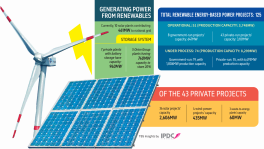South Africa may sell AstraZeneca shots as it switches to J&J vaccine to fight variant
One million doses of the AstraZeneca vaccine, produced by the Serum Institute of India, landed in the country last week, and another 500,000 are due to arrive in coming weeks

South Africa's health minister said on Wednesday the government may sell doses of AstraZeneca's Covid-19 vaccine it may not need or swap for a different vaccine, as it scrambles to start inoculating its citizens with an alternative US shot next week.
The unusual move comes just days after South Africa paused the rollout of the vaccine developed by AstraZeneca and Oxford University following a small clinical trial that showed it offered minimal protection against mild to moderate illness from the 501Y.V2 variant dominant in the country.
One million doses of the AstraZeneca vaccine, produced by the Serum Institute of India, landed in the country last week, and another 500,000 are due to arrive in coming weeks. That's enough to inoculate 750,000 people.
South Africa was also expecting to receive AstraZeneca shots via the Covax global vaccine distribution scheme co-led by the World Health Organization (WHO) and an African Union (AU) arrangement.
Health Minister Zweli Mkhize told a news conference the country would start vaccinating health workers with Johnson & Johnson's vaccine in the form of an "implementation study" with researchers sometime next week.
He said he would wait for advice from scientists before proceeding with the possible sale or switch of the British shot.
"Why not sell the AstraZeneca to other countries? Well it's an option ... we will consider it. First our scientists will tell us what we do with it. Can we use it within the time that's available ... before it expires?" Mkhize said.
"If not, can we swap it with anyone else, because we've discussed it with Covax and with AVATT (the AU's vaccine task team), so we will see what we will do."
It is not clear how a sale or swap would work given the varying prices for vaccines around the world, or whether the British drugmaker would have to agree to such a move. The Serum Institute and AstraZeneca declined to comment.
Still, in a briefing to lawmakers later in the day, Mkhize said the government wanted to see whether it could swap AstraZeneca shots it had ordered from the Serum Institute for doses of a different vaccine available under the Covax scheme run by the WHO and international vaccines alliance Gavi.
The move is the latest twist in a saga that has engulfed South Africa this week as it tries to tame the fast-spreading variant. The country's death toll is nearing 47,000 and infections have surpassed 1.47 million.
A WHO panel said on Wednesday that the AstraZeneca vaccine was safe and effective and should be deployed widely, including in countries where the 501Y.V2 variant could reduce its efficacy. Gavi said Covax was exploring ways for countries participating in the facility to exchange vaccine doses with each other to optimise for their needs.
Alternatives
Turning to J&J for alternative supplies is another blow to AstraZeneca, whose vaccine is considered critical for poor nations because it is cheap and easy to store.
South Africa's Ministerial Advisory Committee should be able to give a considered view on how to deal with the AstraZeneca vaccine in the next week or two, Mkhize said, adding the government had also secured doses from Pfizer for health workers.
Negotiations with Moderna, China's Sinopharm and over Russia's Sputnik V vaccine are ongoing.
Mkhize referred to the first batch of J&J doses as "bridging stock" and said they could arrive next week.
Officials previously said the country had secured 9 million J&J single-dose shots, and Mkhize said a deal could be finalised soon.
Glenda Gray, Medical Research Council (MRC) president, said the government and the MRC aimed to immunise up to 500,000 health workers in the J&J study, with batches of around 80,000 doses arriving every seven to 14 days once the study is approved.
Eventually, most of the J&J supplies could come from local pharmaceutical company Aspen, which is due to bring production on stream around April, Mkhize said.
The J&J vaccine was 89% effective at preventing severe disease and 57% effective against moderate to severe disease in the South African leg of a large global trial. About 95% of infections in the local study were due to the 501Y.V2 variant.
The variant has alarmed health experts who have raised concerns about its ability to potentially evade the immune response generated by prior exposure to the coronavirus or vaccines.
South Africa's neighbour eSwatini said on Tuesday it would not use the AstraZeneca vaccine.


 Keep updated, follow The Business Standard's Google news channel
Keep updated, follow The Business Standard's Google news channel
















